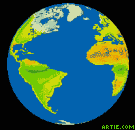|
|
Canku Ota |
|
|
(Many Paths) |
||
|
An Online Newsletter Celebrating Native America |
||
|
June 16, 2001 - Issue 38 |
||
|
|
||
|
Losing the World's Languages |
||
|
by Joan Lowry Scripps Howard News |
 Just as the world is becoming less biologically diverse, it is also becoming less linguistically
diverse. By the end of this century, linguists believe that at least half of the 6,800 languages spoken today will
be extinct. Just as the world is becoming less biologically diverse, it is also becoming less linguistically
diverse. By the end of this century, linguists believe that at least half of the 6,800 languages spoken today will
be extinct.Some experts forecast the loss could be as high as 90 percent, according to research associate Payal Sampat of the Worldwatch Institute in Washington. Already, an estimated 4,000 to 9,000 languages have disappeared over the last five centuries due to wars, genocide, bans on regional languages, and cultural assimilation of ethnic minorities, Sampat said, writing in "Vital Signs 2001,'' a report on world trends released Thursday. Only 600 of the world's languages are considered "safe'' from extinction because they are still being learned by children, Sampat said. The world's most popular language by far is Mandarin Chinese, with 885 million speakers. The next most popular languages in order are: Spanish, English, Arabic, Bengali, Hindi, Portuguese, Russian, Japanese and German. English, which has become the international language of commerce and technology, is spoken by more people as a second language, 350 million, than as a native tongue, 322 million. "Some of the most biologically diverse regions are also the most linguistically rich,'' Sampat said. "Islands, for instance, have spawned unique speeches as well as species because of their physical isolation from larger land masses.'' Amazingly, 110 languages are spoken on the tiny Pacific archipelago of Vanuatu, Sampat noted. Obscure languages are not limited to far-flung island nations or remote wildernesses. The nooks and crannies of Europe, for instance, are losing languages they have sheltered for centuries. Two languages to become extinct in the late 20th century include Manx, once spoken on the Isle of Man, and Ubykh, a Caucasian language with more consonants than any other and which had 50,000 speakers just a century ago. Only six out of 300 native languages spoken in what is now the United States when Columbus arrived in 1492 are still spoken by more than 10,000 people. Perhaps the world's most endangered language is Alaska's Eyak, which has just one remaining speaker. Idaho's Coeur D'Alene has just five speakers. Despite this "discouraging picture,'' some languages once given up for dead are making a comeback, Sampat said. For example, Cornish, a Celtic language thought to have lost its last speaker in 1777, has been revived and now has 2,000 speakers. The most dramatic example is Hebrew, which was almost purely a written language a century ago, but which is now Israel's national language and has more than 5 million speakers. The disappearance of languages has "global significance,'' Sampat said. "Languages hold important clues to human history, helping to explain, for instance, ancient migration routes between countries.'' "Loss of linguistic diversity also diminishes our understanding of biological diversity ... Native Hawaiians named fish species for their breeding seasons, medicinal uses and methods of capture.'' Some language experts contend humankind needs linguistic diversity to remain healthy and that the loss of so many of the world's languages could have disastrous consequences. In their book last year, "Vanishing Voices: The Extinction of the World's Languages,'' anthropologist Daniel Nettle and linguist Suzanne Romaine argued that "the loss of linguistic and cultural diversity should be seen as an integral part of larger processes threatening biodiversity on Earth.'' |
|
Indigenous Language Institute |
|
Foundation For Endangered Languages |
|
|
||
|
|
||
| Canku Ota is a free Newsletter celebrating Native America, its traditions and accomplishments . We do not provide subscriber or visitor names to anyone. Some articles presented in Canku Ota may contain copyright material. We have received appropriate permissions for republishing any articles. Material appearing here is distributed without profit or monetary gain to those who have expressed an interest. This is in accordance with Title 17 U.S.C. section 107. | ||
|
Canku Ota is a copyright © 2000, 2001 of Vicki Lockard and Paul Barry. |
||
|
|
|
|
|
The "Canku Ota - A Newsletter Celebrating Native America" web site and its design is the |
||
|
Copyright © 1999, 2000, 2001 of Paul C. Barry. |
||
|
All Rights Reserved. |
